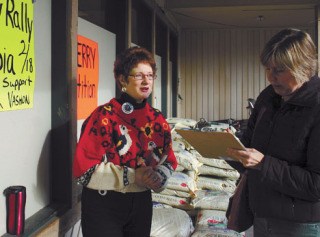Residents from Vashon, Bainbridge and several other ferry-served communities have banded together to draft an alternative to the long-term plans put forth by Washington State Ferries — plans some say are unrealistic and unacceptable.
The initiative comes in the wake of mounting disappointment over the proposals the state ferry system has put forward — dubbed “Plan A” and “Plan B” — in an effort to shore up the financially ailing system. The latter, the more Draconian of the two, would reduce the three-boat system on the north end of the Island from three boats to two and replace the Rhododendron with the smaller Hiyu on the Tahlequah-Point Defiance route.
“The reaction from basically all the ferry communities is that ‘Plan A’ and ‘Plan B’ were very short-term and short-sighted and did not reflect any of the needs of residents in ferry-served communities,” said Kari Ulatoski, chair of the Vashon-Maury Island Community Council’s transportation committee. “What was proposed is totally insufficient.”
The effort to write a third long-range plan for WSF was initiated by Rep. Larry Seaquist, who represents much of the Kitsap Peninsula — including Southworth and Bremerton.
Seaquist is asking for help in crafting a plan for the state’s marine highways that would make the system financially solvent while providing better service to Puget Sound communities than the proposals WSF has put forth. He’s calling his citizen-crafted proposal “Plan C.”
Seaquist said he decided to take the lead on a third option after he heard from dozens of constituents that they weren’t happy with the direction WSF was heading and that neither Plan A nor B would work for the people of Kitsap Peninsula.
“I think the simple characterization is our ferry system is too small, too old and badly managed. We need a newer ferry system with more service and much better management,” he said.
Ferry-served communities have been working cooperatively for a couple of years in an attempt to have a stronger voice in the Legislature. The citizen-run effort to craft Plan C reflects a much bigger and more organized attempt to shape the Legislature’s agenda.
Some 300 people are involved in crafting Plan C, Seaquist said. He and other ferry advocates have created a Web site about the effort — citizenswritePlanC.com — that lists six committees headed by citizens to address several concerns.
The site also contains an online petition spearheaded by Joe Ulatoski and other Islanders calling on the governor and Legislature to
address what it calls “a totally unacceptable” ferry system.
On Vashon alone, more than 2,000 Islanders have signed the petition, Joe Ulatoski estimates.
Meanwhile, ferry advocates are organizing a Feb. 18 rally in Olympia that they hope draws a huge crowd.
“The ferry users of the state have become very upset with the plans and programs and the lack of any long-term funding. And this is manifesting itself in the development of an informal organization that is now dedicated to taking some action,” Joe Ulatoski said.
Seaquist said he’s prepared to carry Plan C as far as he can in the Legislature and will stand behind the proposal once it is finalized later this month.
“We’re not doing this for fun. We’re doing this to change the way the system is run. Let’s get it passed,” he said.
Seaquist is holding a meeting on Saturday in Bremerton to determine just what Plan C will say.
“We’re not writing pie-in-the-sky things,” he said. “We’re practical people, and we know this is our money.”
He said Plan C will include answers to several key questions — how much ferry service is needed, how many boats that will take, how many boats should be built to accommodate growing need and how much money the system will need to make it all happen.
“At every point, we’re looking for ways to save money,” Seaquist said.
He noted that WSF employees have approached him to tell him they support Plan C. Plans A and B hurt them, too.
“Crews believe they can help cut overtime costs,” he said. “The crews say they believe we can run this system for less.”
Seaquist is emphatic about the importance of ferries to the economic health of Vashon and Kitsap.
“Everybody on Vashon knows that the social and economic survival of every family and business on Vashon depends on the ferries,” he said. “That’s almost just as true for everybody over here in the west Puget Sound. It affects the price of the home, where they live, whether they can come to the west Sound. Ferries are our economic lifeline. Neither Plan A or Plan B was framed with an understanding that this is vital to us.”



